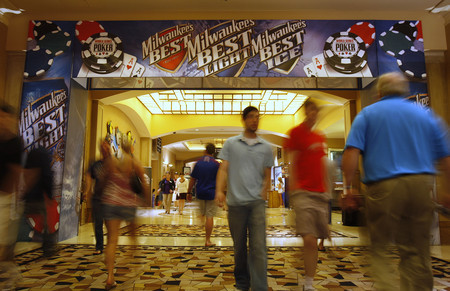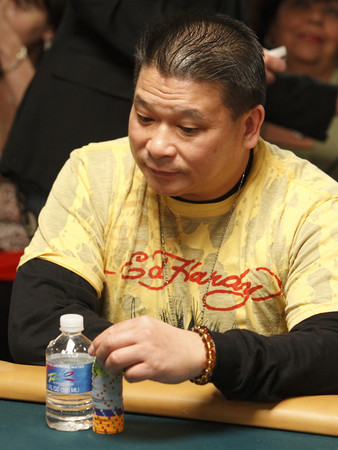World Series of Poker expects to set records despite recession
What economic downturn?
Even in the midst of a recession, attendance at this year's multiweek World Series of Poker at the Rio will probably set records.
"We're beyond ecstatic," Seth Palansky, series director of communication, said Thursday, the day before the 40th World Series of Poker's main event kicks off. "Everything you read and heard about for the past several months led us to believe we would be swept up in it. But the resiliency of the poker community has humbled us. We are on par to set records again this year."
Series officials had been worried that the various tournaments, which began May 26, would fail to break the 50,000-entries mark because of the economy.
"You just look and see things are down up to 27 percent across this town and across this country," Palansky said. "So you put in a number like that against our registration numbers last year, and you would have felt we would have come in down as well."
Palansky said event officials had considered running a "new economy tournament" but decided not to pull back on any of the events.
"To (series commissioner) Jeffrey Pollack's credit, he said, 'No, we owe it to whoever shows up to run it like we've always run it and offer what we've always offered,' " Palansky said. "And the poker players showed up."
Through Wednesday, the first 55 events of the 57 event series had drawn more than 53,460 entries and awarded more than $111.6 million in pay-outs.
Last year, the series paid out $180.7 million in prize money and drew 58,720 entries, with 6,844 of those entries for the main event's $10,000 buy-in no-limit Texas hold'em tournament.
The final event begins today at noon and runs until July 15, when a final table of nine players will be decided. Those players will return Nov. 7 to decide the champion.
Not everyone is as happy about the World Series as Harrah's Entertainment, which bought the series in 2004. One of poker's legendary players and a two-time main event winner lashed out at how the gaming company has run the event and treats the players.
"In the old days, when Jack Binion owned it, he never took a penny out, but we always tipped the dealers good anyway," Johnny Chan said, complaining about how the gaming company has increased its cut of the players' pool. "Now Harrah's takes out 4 to 10 percent."
The company also has cut back on its comps to players, Chan said. Harrah's gave him only a $100 food coupon when he entered the $50,000 buy-in H.O.R.S.E. event last week, he said.
"It was a gradual change," Chan said, referring to the years since Harrah's bought the brand. "The tournament got bigger and they got greedy and they wanted to take more money out."
Palansky offered no apologies, however, and noted how the tournament has grown under Harrah's control.
"We're not ashamed that we run a business," Palansky said. "And we believe we offer all poker players the largest prize pools and the best opportunities for fame and fortune in all of poker. We're very consumer conscious, and we believe we've priced our events and the small percentage we take out in order to run the event effectively and successfully and are comfortable."
Since the series was moved to the Rio from Binion's downtown in 2005, the event has moved from just one ballroom to three, Palansky said. That has meant higher costs, for surveillance, food and beverage, lighting, tables, and a doubling in the number of dealers from 450 to more than 1,000 this year.
Chan is the last player to win the main event in consecutive years, which he achieved in 1987 and 1988. He is tied for second in most gold bracelets with 10. Coming into this year, he was 17th on the series' all-time money list with $4.15 million in winnings.
But when Chan won the main event in 1988, he defeated a field of just 167 and took home only $700,000. Last year's winner, Peter Eastgate, got $9.2 million.
The entry fees from players are used for the pots and other expenses.
Of the $68.4 million put in by players entering last year's main event, $64,431,779 went to the players. Roughly $2,9 million, or 4.2 percent, went to Harrah's and $1.2 million, or 1.8 percent, was used to pay staff.
The amount removed from other events is as high as 7 percent for expenses and 3 percent to pay for staff.
Chan, who won his last gold bracelet in 2005 but only entered six events this year, thinks that's too much.
"I love the game. I love poker," Chan said. "I don't want the big corporation just taking advantage of it."
The practice of taking money from the players' pool at the World Series of Poker began in 2001 when Becky Binion Behnen took out 3 percent for staff.
Contact reporter Arnold M. Knightly at aknightly @reviewjournal.com or 702-477-3893.


















